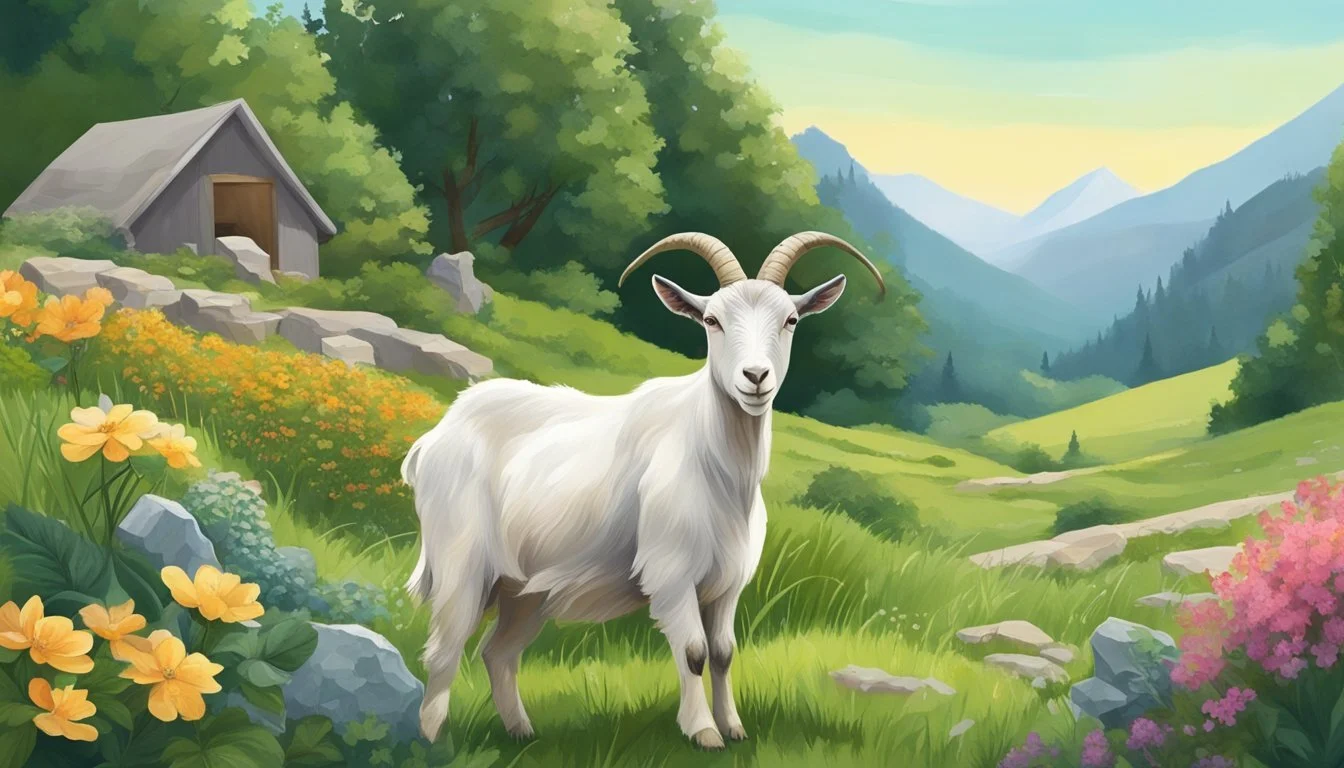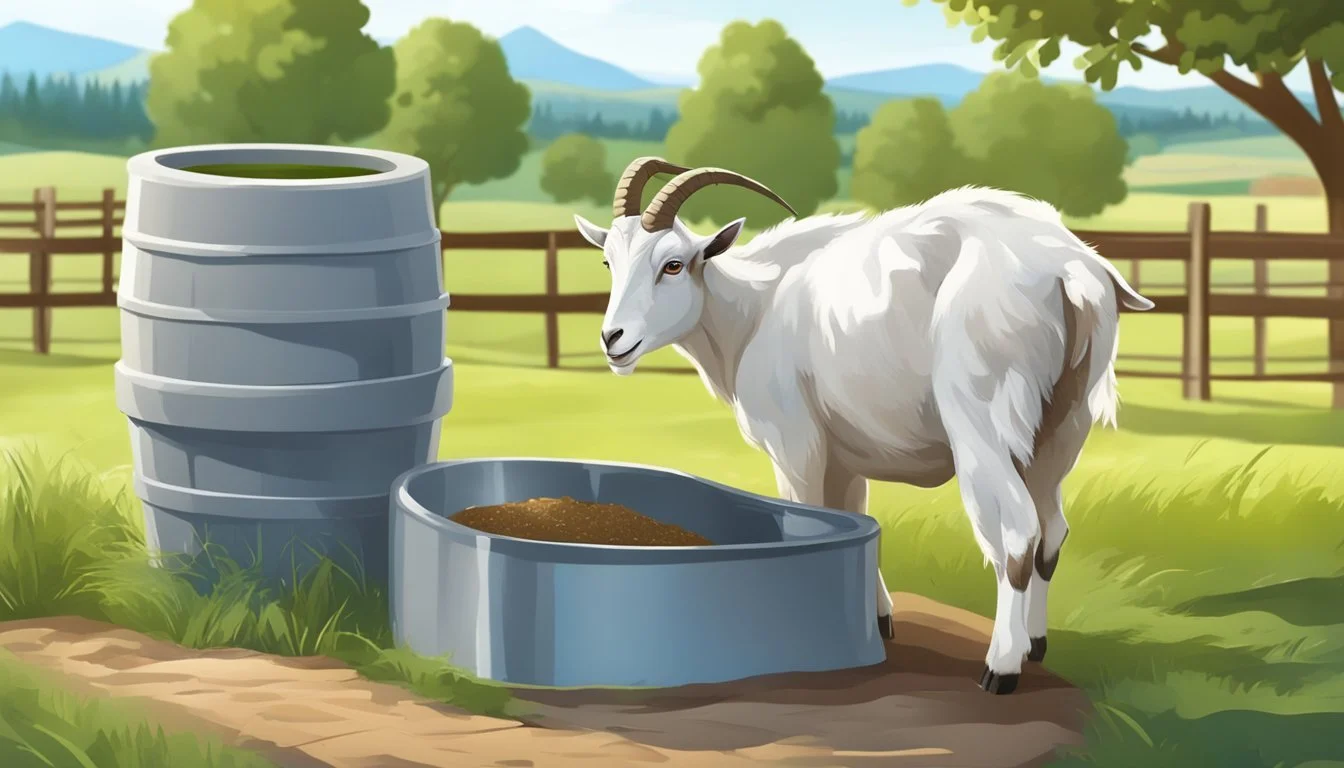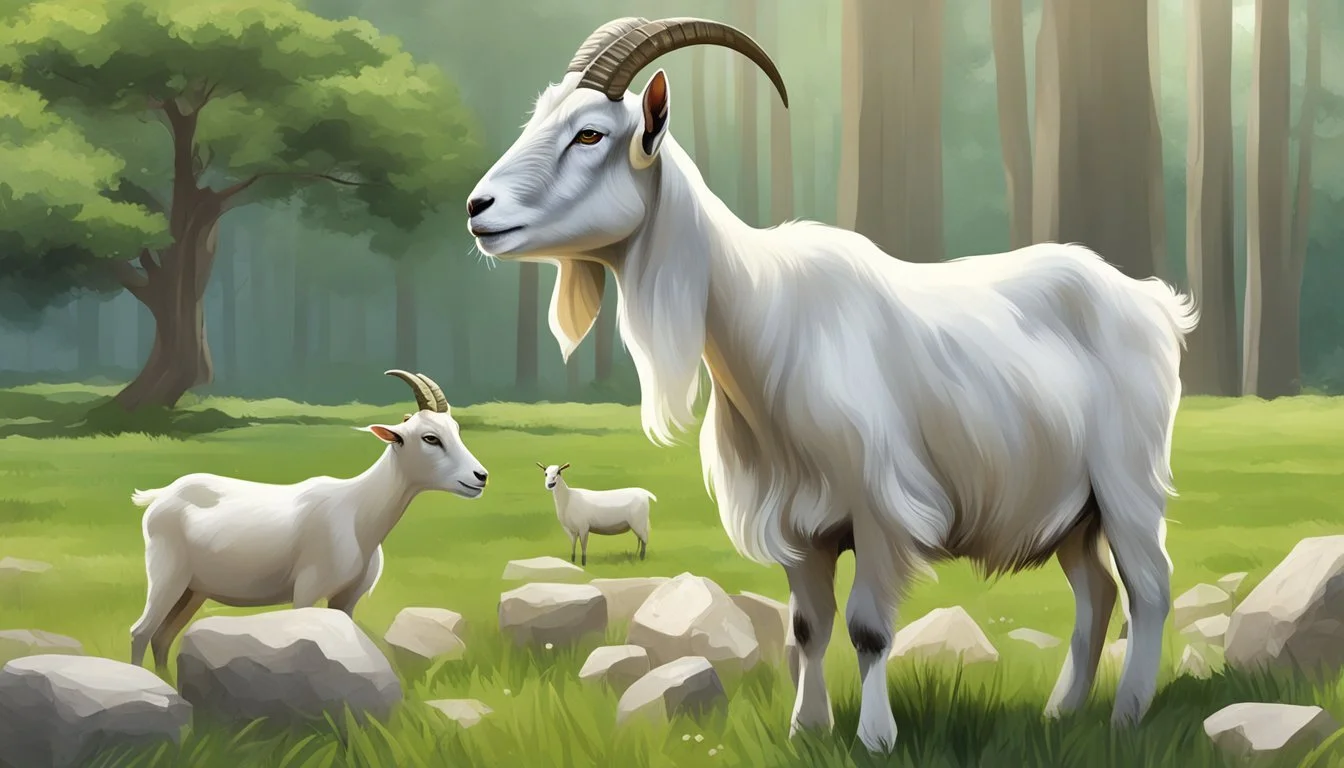How to Ensure a Balanced Mineral Intake for Your Milking Goat
Essential Nutrition Tips
Ensuring a balanced mineral intake is crucial for maintaining the health and optimizing milk production in goats. Minerals play a vital role in various physiological processes, from bone development to enzyme function. When goats are milked, their need for these nutrients increases to support both their own health and the nutritional quality of their milk. Neglecting this aspect of their diet can lead to deficiencies, affecting their well-being and the profitability of a dairy operation.
Adequate mineral consumption can vary, influenced by factors such as forage quality and the physiological state of the goat. Lactating goats, for instance, require an increased intake of calcium and phosphorus to maintain adequate milk production. Offering a balanced, loose, free-choice goat mineral mixture can support the variable mineral needs of goats throughout different stages of lactation and life. While natural forage may provide some amount of minerals, it is often insufficient, highlighting the importance of a carefully chosen supplementation program.
Monitoring and adjusting the mineral intake of milking goats is an ongoing process. Producers must be vigilant and proactive, frequently assessing the condition of their animals and the quality of available forage. This will ensure that the goats receive all essential macro and trace minerals in the correct proportions, thus safeguarding their health and optimizing their milk output.
Understanding Goat Nutrition
In milking goats, optimal nutrition is critical to support their health, growth, and reproduction. A balanced mineral intake is particularly important for preventing deficiencies that can impact overall wellbeing.
The Role of Minerals in Goat Health
Minerals are essential for a variety of physiological processes in goats, including bone development, enzyme activation, and maintaining osmotic balance. Calcium and phosphorus are vital for bone structure and milk production, while deficiencies in minerals like cobalt, iodine, and selenium can lead to poor growth and reproductive issues. Information on the balance of calcium to phosphorus can be found within the OSU Extension PDF guide on goat nutrition.
Macrominerals and Trace Minerals
Macrominerals such as sodium, chloride, potassium, magnesium, and sulfur are needed in larger quantities than trace minerals. They play crucial roles in nerve transmission, muscle function, and fluid balance.
On the other hand, trace minerals, although required in smaller amounts, are no less vital. These include copper, zinc, manganese, and iron, which are integral for enzymatic functions and immune system health. An appropriate mineral balance is essential, as highlighted by Purina Animal Nutrition, and is crucial for both dairy and meat goat production.
To keep milking goats in peak condition, understanding and managing their mineral intake is paramount for maintaining a high level of health and productivity.
Assessing Mineral Needs
A comprehensive understanding of your milking goat's mineral needs is crucial for optimal milk production and overall goat health. Minerals play a vital role in the biological processes that support growth and well-being in goats.
Factors Affecting Mineral Requirements
Several factors influence the mineral requirements of milking goats. These include:
Genetics: Different breeds may require varying levels of certain minerals.
Life Stage: Lactating does have higher mineral needs compared to non-lactating goats.
Forage Quality: The mineral content of the consumed forage greatly affects the overall mineral intake.
Health Status: A goat's current health can alter its mineral needs; certain conditions may necessitate a specific mineral balance.
Regular forage analysis is advisable to ensure the forage provides the proper nutrients necessary for maintaining a balanced diet.
Identifying Signs of Mineral Deficiency
Recognizing signs of mineral deficiency is vital for the early intervention and prevention of long-term health issues. Some symptoms to watch for include:
Poor Growth: Stunted growth may indicate a deficiency in essential minerals.
Dull Coat: An early sign of various mineral deficiencies is a coat that lacks luster.
Reproductive Issues: Difficulties with conception and kidding can emerge from inadequate mineral nutrition.
Careful observation of the herd's overall condition can provide initial clues to potential deficiencies.
Working with a Nutritionist
Consulting with a feeding nutritionist is critical when assessing and planning a milking goat's mineral intake. They can offer professional guidance on:
Diet Analysis: Evaluating whether the current diet meets the herd's mineral requirements.
Supplement Strategies: Recommending specific mineral supplements to address deficiencies.
Monitoring Programs: Setting up a protocol to regularly evaluate and adjust mineral levels in the diet.
Nutritionists ensure that mineral supplementation is both effective and economical, preventing both deficiency and excess.
Feeding for Mineral Balance
Achieving a balanced mineral intake in milking goats hinges on the right combination of forage, grain, and supplements. This section elucidates best practices to ensure goats receive the minerals they need for optimal milk production and health.
Importance of Forage Quality
Forage is the foundation of a goat’s diet and plays a crucial role in providing necessary minerals. High-quality forage, such as legume hays like alfalfa, are rich in calcium and other minerals. It's essential to test forage to determine its mineral content and pH level, ensuring it has a balanced nutritional profile for the goats' needs. Goats also need forage with adequate fiber to maintain rumen health, which is a key factor in efficient nutrient and mineral absorption.
Choosing the Right Grain and Concentrate
While forage offers the bulk of necessary nutrients, grain and concentrate can supplement a goat's diet to improve mineral balance. Milking goats have higher protein and energy requirements; grains, when selected appropriately, can meet these needs. Opt for a grain or concentrate that complements the forage's nutritional content. For instance, if the forage is low in phosphorus, select a grain with higher phosphorus content to maintain the critical calcium-to-phosphorus ratio in the diet.
Supplementing with Mineral Mixes
Mineral mixes are indispensable in a milking goat's diet to fill any gaps left by forage and grain. A reliable goat mineral supplement should contain a balance of calcium, phosphorus, magnesium, and trace elements like selenium and zinc. Experts recommend loose, free-choice mineral mixes over blocks because they allow goats to consume as per their individual needs. Monitoring consumption of these supplements is vital to avoid deficiencies or excesses, which can both have negative impacts on health and production.
Water and Mineral Intake
A balanced mineral intake is essential for the health and productivity of milking goats. Ensuring that goats have access to clean water is fundamental for proper digestion and mineral absorption.
Quality of Water Source
The quality of the water source directly impacts a goat's health. Contaminated or poor-quality water can lead to reduced mineral consumption and potentially harm overall health. Water should be free of contaminants, toxins, and excessive minerals that can interfere with the absorption of necessary nutrients. Regular testing of the water source is important to maintain the purity of the water and prevent the buildup of harmful substances that can affect both water palatability and mineral balance.
Correlation Between Water and Mineral Absorption
The relationship between water and mineral absorption is significant in the digestion process of milking goats. Adequate water consumption facilitates the dissolution of minerals, making them more accessible for absorption in the digestive tract. Goats require a consistent supply of water to ensure optimal digestion and utilization of minerals like calcium, phosphorus, and magnesium, which are critical for milk production and bone health. It is also noteworthy that water intake may increase when a diet is rich in minerals, as this helps to maintain proper osmotic balance within the body.
Specific Mineral Requirements
Milking goats require specific minerals in their diet to maintain optimal health, support lactation, and ensure fertility. These minerals are vital for preventing diseases and deficiencies that can impact the productivity and well-being of the goat.
Calcium and Phosphorus: Balancing Act
Calcium and phosphorus are two macro-minerals that are critical for a milking goat's bone health, milk production, and proper functioning of the nervous system. The calcium ratio should ideally be between 1:1 and 2:1, and for goats, a ratio of 1.2-1.5:1 is preferred. This balance helps prevent conditions such as hypocalcemia and urinary calculi, which can have serious health implications. Monitoring this ratio is especially important in lactating goats because their demand for calcium is high during this period.
Selenium and Vitamin E: Preventing White Muscle Disease
Goats need adequate levels of selenium and vitamin E to prevent white muscle disease, which is characterized by muscle weakness and can be fatal especially in kids. These nutrients act synergistically and are essential for immune function. Deficiencies can lead to reproductive issues and compromised health. It's crucial to ensure these minerals are available in their diet, with careful attention to not exceed the narrow safety margin, as excess can be toxic.
Copper and Iron: Preventing Anemia
Adequate intake of copper and iron is necessary to prevent anemia in goats. Copper is important for the utilization of iron and should be carefully balanced, as goats are susceptible to copper toxicity. Iron is critical for red blood cell formation, and an iron deficiency can lead to anemia, reducing the oxygen-carrying capacity of the blood and impacting the goat's overall energy levels and productivity.
Magnesium, Sodium, Potassium: Avoiding Grass Tetany
These macrominerals, magnesium, sodium, and potassium, play vital roles in nerve function, muscle contractions, and fluid balance. Particularly, magnesium is essential to prevent grass tetany, a condition that can occur during the rapid growth of spring grass and can be life-threatening. Adequate sodium is required for milk production, and potassium is crucial for maintaining the acid-base balance in goats. It's essential to ensure that milking goats have access to a balanced, loose, free-choice goat mineral that meets these needs.
Each of these minerals plays a distinct and pivotal role in the health and productivity of milking goats. To sustain their well-being, it's essential to provide a diet that meets these specific mineral requirements.
Monitoring and Adjusting Mineral Intake
Maintaining the correct balance of minerals is crucial for the health and productivity of milking goats. It involves regular assessments and making necessary adjustments in response to various physiological and environmental factors.
Regular Health Checks with a Veterinarian
It's imperative to schedule regular health checks with a veterinarian to ensure that your milking goats have an optimal mineral balance. These health checks should assess levels of key minerals, such as calcium and phosphorus, which are vital during periods of high milk production. Veterinarians can conduct blood tests and examine physical signs to detect any mineral deficiencies or imbalances.
Adjusting Mineral Intake Throughout Life Stages
The mineral requirements of milking goats change at different life stages such as kidding, pregnancy, lactation, and growth. For instance, during lactation, a goat's need for calcium significantly increases to support milk production. A veterinarian or a goat nutrition expert can help tailor the mineral supplementation to suit these varying needs throughout each stage.
Kidding: Increase calcium and phosphorus to support fetal development.
Pregnancy: Sustain adequate mineral levels for the health of both doe and kids.
Lactation: Enhance the diet with minerals that are heavily utilized in milk production.
Response to Environmental and Dietary Changes
Environmental factors such as stress and dietary changes can affect a goat's mineral intake. Goats subjected to high temperatures or cold stress may require adjustments in their mineral supplementation. Also, changes in feed quality or forage availability necessitate a close watch on their mineral status.
Stress: Monitor for signs of mineral depletion, and adjust the diet accordingly.
Environmental Changes: React to temperature shifts by modifying mineral intake to maintain health.
By keeping a watchful eye on these aspects and consulting with professionals, farmers can help ensure their milking goats receive the necessary minerals for optimal health and productivity.
Managing Mineral Intake of Grazing Goats
Ensuring goats receive a balanced mineral intake while grazing is paramount for their health and productivity. Grazing goats can experience mineral deficiencies if their forage lacks specific nutrients, making it vital to assess and supplement their diet accordingly.
Assessing Pasture Mineral Content
One begins by determining the mineral content of the pasture. A forage analysis should be conducted to identify which essential minerals are present and in what quantities. This analysis can reveal deficits of macrominerals like calcium and phosphorus and trace minerals essential for milking goats.
Providing Loose Minerals in the Pasture
Loose minerals should be accessible to goats at all times to complement what they receive from forage. It should be a balanced, free-choice mineral specifically formulated for goats, as their needs differ significantly from other livestock. Avoid using salt blocks designed for other species as this does not meet the specific mineral requirements of goats.
Adapting to Grazing Season Variability
Changes in forage quality throughout the grazing season can lead to fluctuations in mineral content. Therefore, one should adjust the type and amount of supplemental minerals provided to account for these variances. Monitoring the goats for signs of mineral deficiencies or excesses throughout different seasons is also crucial.
By methodically assessing the forage attributes, supplying quality loose minerals, and adapting to seasonal forage changes, one can maintain the health and productivity of their grazing goats.
Managing Risks and Diseases Related to Minerals
Proper mineral management is crucial for maintaining goat health and preventing diseases such as copper toxicity, urinary calculi, hypocalcemia, and milk fever. Ensuring that milking goats have a balanced mineral intake can mitigate these risks.
Copper Toxicity and Other Mineral Imbalances
Copper is an essential mineral for goats, but an excess can lead to copper toxicity, a condition that can cause severe health issues and even death. Goats require a delicate balance of minerals in their diet, especially because the copper requirement of goats is higher than sheep, yet they can tolerate less copper than cattle. To manage copper levels, regularly test forage and water sources for mineral content and adjust the diet accordingly. Common symptoms of copper toxicity include lethargy, loss of appetite, and sudden death in severe cases.
Preventing Urinary Calculi in Bucks
Urinary calculi, a condition characterized by the formation of stones in the urinary tract, can be life-threatening for bucks. This issue is typically related to an imbalance of dietary minerals, particularly a high phosphorus-to-calcium ratio. To prevent urinary calculi, ensure that the diet has a proper calcium-to-phosphorus ratio (2:1 is commonly recommended). Strategies include:
Providing a diet with enough long-stem forage to stimulate chewing and, therefore, saliva production, which is high in calcium.
Avoiding excess grain feeding as grains are typically high in phosphorus.
Providing access to ample fresh water to promote regular urination, which helps flush out excess minerals.
Dealing with Hypocalcemia and Milk Fever
Hypocalcemia, also known as milk fever, is a serious condition that occurs when there is a sudden drop in blood calcium levels in goats, particularly around the time of kidding. It is imperative to provide a diet that supports calcium levels, especially during late gestation and early lactation when the demand for calcium is at its peak. Preventive measures include:
Feeding a ration with adequate levels of calcium and vitamin D to support proper calcium metabolism.
Reducing calcium intake slightly before kidding to stimulate the goat's natural calcium regulatory system.
Monitoring goats closely during the risk period for signs of milk fever, which include weakness, tremors, and inability to stand.
Comprehensive Mineral Management Plan
To ensure the health and productivity of milking goats, a comprehensive mineral management plan is essential. It involves structured feeding schedules and meticulous record-keeping to track mineral intake effectively.
Developing a Feeding Schedule
Developing a feeding schedule to meet the specific mineral needs of milking goats is crucial for maintaining their health and optimizing milk production. By tailoring the diet to include adequate amounts of minerals like calcium, phosphorus, and trace elements, producers can support the high demands of lactation and growth rate. Ensuring the right balance of forage and supplements at different life stages helps avoid deficiencies or toxicities.
Daily Mineral Intake: Implement and strictly follow a daily mineral feeding routine with the following components:
Calcium: Necessary for milk production and bone growth.
Phosphorus: Works with calcium and is vital for various body functions.
Trace Minerals: Including copper, zinc, and selenium, which are essential for immune function and overall health.
Record Keeping and Tracking
Accurate record keeping and tracking of mineral supplements are indispensable in a management program. It serves as a tool to:
Monitor consistencies and irregularities in diet.
Adjust feeding protocols based on individual or group needs.
Review and analyze growth rate and health trends.
Maintaining detailed logs helps pinpoint the effectiveness of the mineral feeding schedule and the need for any adjustments. Records should cover:
Intake Records: Document quantities and types of minerals provided.
Health Assessments: Regularly note any health changes that may indicate mineral imbalances.
Maintenance Interventions: Record any corrective actions taken to address mineral deficiencies or excesses.
Conclusion
Adequate mineral intake is critical for maintaining the health and milk production of milking goats. They require a complex range of minerals in their diet, including both macro and microminerals. To ensure goats are receiving a balanced diet, owners must provide access to high-quality forage, grains, and a mineral supplement that meets their specific dietary needs.
Mineral supplements are essential, as they contribute to various physiological functions and prevent deficiencies that can compromise milk yield and goat health. Remember, a free-choice, loose mineral formulated for goats is superior to a generic livestock block. Goats typically require ¼ to ½ ounce per day of these well-balanced minerals for good health.
Keep in mind the importance of a balanced diet—too much or too little of a certain mineral can be detrimental. Regularly assess the body condition and milk production to adjust the diet as necessary.
By prioritizing a balanced mineral intake, you support the well-being of your milking goats and ensure a sustainable and productive milking operation.







